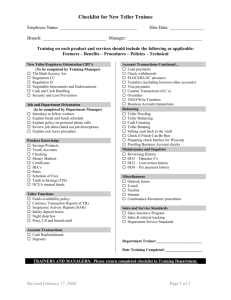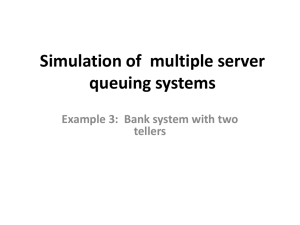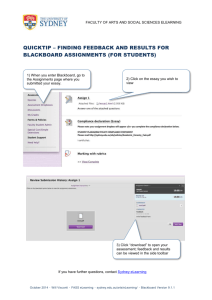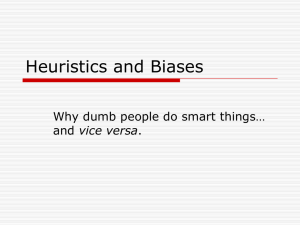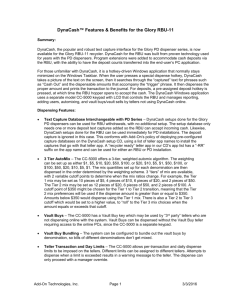X200 Scientific Reasoning
advertisement
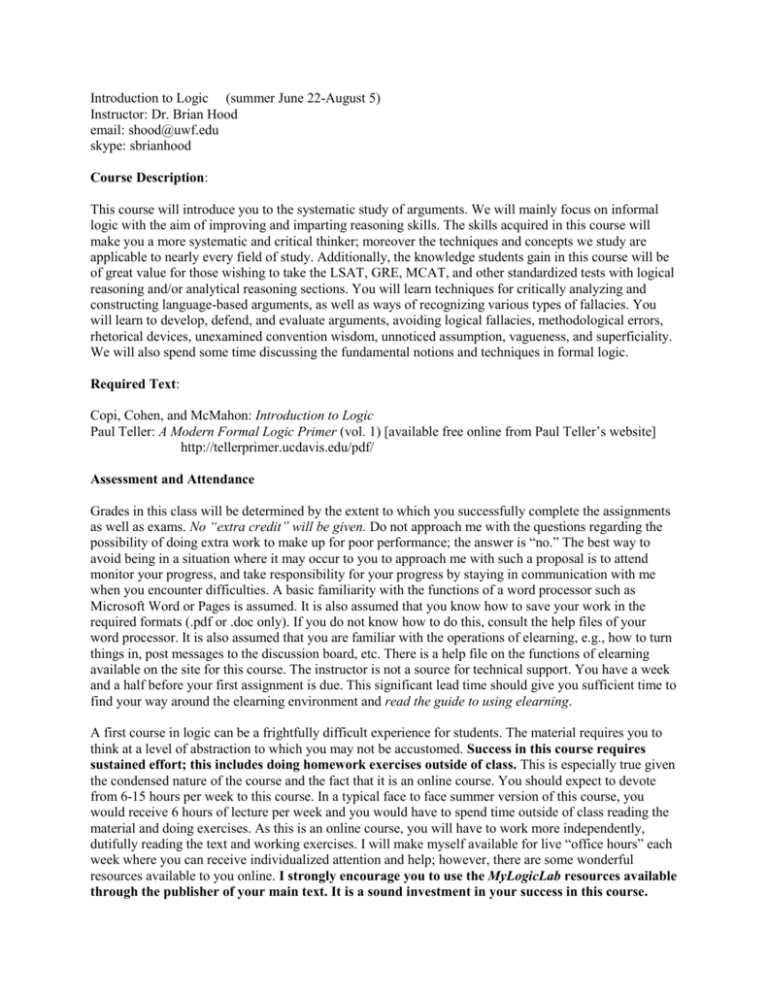
Introduction to Logic (summer June 22-August 5) Instructor: Dr. Brian Hood email: shood@uwf.edu skype: sbrianhood Course Description: This course will introduce you to the systematic study of arguments. We will mainly focus on informal logic with the aim of improving and imparting reasoning skills. The skills acquired in this course will make you a more systematic and critical thinker; moreover the techniques and concepts we study are applicable to nearly every field of study. Additionally, the knowledge students gain in this course will be of great value for those wishing to take the LSAT, GRE, MCAT, and other standardized tests with logical reasoning and/or analytical reasoning sections. You will learn techniques for critically analyzing and constructing language-based arguments, as well as ways of recognizing various types of fallacies. You will learn to develop, defend, and evaluate arguments, avoiding logical fallacies, methodological errors, rhetorical devices, unexamined convention wisdom, unnoticed assumption, vagueness, and superficiality. We will also spend some time discussing the fundamental notions and techniques in formal logic. Required Text: Copi, Cohen, and McMahon: Introduction to Logic Paul Teller: A Modern Formal Logic Primer (vol. 1) [available free online from Paul Teller’s website] http://tellerprimer.ucdavis.edu/pdf/ Assessment and Attendance Grades in this class will be determined by the extent to which you successfully complete the assignments as well as exams. No “extra credit” will be given. Do not approach me with the questions regarding the possibility of doing extra work to make up for poor performance; the answer is “no.” The best way to avoid being in a situation where it may occur to you to approach me with such a proposal is to attend monitor your progress, and take responsibility for your progress by staying in communication with me when you encounter difficulties. A basic familiarity with the functions of a word processor such as Microsoft Word or Pages is assumed. It is also assumed that you know how to save your work in the required formats (.pdf or .doc only). If you do not know how to do this, consult the help files of your word processor. It is also assumed that you are familiar with the operations of elearning, e.g., how to turn things in, post messages to the discussion board, etc. There is a help file on the functions of elearning available on the site for this course. The instructor is not a source for technical support. You have a week and a half before your first assignment is due. This significant lead time should give you sufficient time to find your way around the elearning environment and read the guide to using elearning. A first course in logic can be a frightfully difficult experience for students. The material requires you to think at a level of abstraction to which you may not be accustomed. Success in this course requires sustained effort; this includes doing homework exercises outside of class. This is especially true given the condensed nature of the course and the fact that it is an online course. You should expect to devote from 6-15 hours per week to this course. In a typical face to face summer version of this course, you would receive 6 hours of lecture per week and you would have to spend time outside of class reading the material and doing exercises. As this is an online course, you will have to work more independently, dutifully reading the text and working exercises. I will make myself available for live “office hours” each week where you can receive individualized attention and help; however, there are some wonderful resources available to you online. I strongly encourage you to use the MyLogicLab resources available through the publisher of your main text. It is a sound investment in your success in this course. You are responsible for staying up to date with course announcements, and thereby for conversance with additional instructions. Course announcements will be made via elearning. Questions and comments about the class are welcome. Assignments Exam 1 Exam 2 Exam 3 Participation Homework 7/8 7/22 8/5 15% 15% 15% 15% 40% Exams: Exams are challenging. They cover a sample of the material since the previous exam. They are mixed-format and may include questions from the exercise sets in your text, hence it would behoove you to dutifully work the exercises in the text. Typically, except in extraordinary cases, scores are scaled so that the highest raw score receives a 100% and all other scores are scaled up the number of points that is the difference between 100 and the highest raw score. Anything I say in online discussion, whether it is contained in the text or not, is fair game. Exams are not cumulative; however, later material builds on earlier material. Therefore, success on later exams requires conversance with earlier material. Make-up exams will be administered only in the case of an extraordinary circumstances. The last exam for this class is due the last day of the summer session. Exams will be administered via elearning. Exams are an individual effort and should not be completed in consultation with other students. Homework: Homework for the week is due Sunday at noon with the exception of the last week (see the schedule). As the homework assignments are given in advance, no late homework will be accepted. All homework is to be typed using a standard font (times new roman or courier new) and standard formatting (e.g., double-spaced, one inch margins, etc.), unless otherwise indicated. All work should be in either .doc or .pdf format and should bear the name of each member of your group (assigned via elearning). I will not accept work in any other format including .docx. I realize that sometimes things happen which may cause you to fail to turn in a homework assignment on time (this includes technical difficulties such as computer crashes, lost/unsaved work), or that somehow keep you from doing your best work. For this reason, your lowest homework grade will be dropped. Homework is graded on a scale of 0-10. I expect that your work will be clearly organized, and written in coherent English sentences (unless the exercise is multiple choice). You may submit them using the dropbox on elearning. Some member of your group will be responsible for typing up and submitting the assignment for the week. I recommend assigning each member of your group a different week early on. Participation Participation is assessed by the degree to which one participates in the online discussion forums. Also discussions regarding the homework should be carried out in the discussion forum. Begin a thread with your group’s name and the week number for the homework assignment. If you do not participate in the discussion thread, it will be assumed that you did not contribute to the work on the assignment which is turned in, and, hence, no credit will be received. You must work through the assignments with your peers in the discussion thread; this is my only way of determining that you were a contributing member of your group. Participation must be substantive. Simple responses such as ‘I agree’, or ‘ok’, will not be counted as participation. On way of participating is for each member of the group to do the work individually and then offer his/her solutions up to the group for discussion, and then as a group you can come to consensus regarding the assignment. Only one copy needs to be submitted. You may also fulfill participation obligations by answering the queries of other students posted in online discussion. By helping to explain a point to a fellow student, you are being a valuable member of our online community; hence, I place a high premium on such contributions. Email Policy Please allow up to 48 hours for me to respond to emails. Often I will answer them sooner than 48 hours, but there is no guarantee that I will do so. I do not respond to emails containing queries that can be answered by reading the syllabus. Hence, if you do not hear back from me, within 48 hours, there is a good chance that your question could be answered by reading the syllabus. Office Hours There will be no on campus office hours. However, I will make myself regularly available via Skype and gchat to answer questions. I may also hold live elluminate sessions. The times for these will be released at a later date and will be announced on elearning. UWF Plagiarism Policy The UWF Student Handbook, Code of Student Conduct, Academic Misconduct, states: "Plagiarism. The act of representing the ideas, words, creations or work of another as one's own." Plagiarism combines theft with fraud, and the penalty is correspondingly severe: failure for the assignment and, in some cases, for the entire course. At the instructor's discretion, she/he may recommend that the student be suspended from the university. Ignorance of the rules about plagiarism is no excuse for it, and carelessness is just as bad as purposeful violation. Students who have plagiarized have cheated themselves out of the experience of being responsible members of the academic community and have cheated their classmates by pretending to contribute original ideas. For complete information regarding Academic Misconduct, refer to the UWF Student Handbook or contact Student Affairs in Building 21, 474-2384. Students with Special Needs The University’s policies for students with special needs is described in the UWF Disabled Student Services publication available at http://uwf.edu/sdrc/dss_pub.pdf Schedule Week Reading 1 6/23-6/30 Copi: Chapter 1 Copi: Chapter 2 2 7/4-7/8 Copi: Chapter 4 Copi: Chapter 11 3 7/11-7/15 Copi: Chapter 12 Copi: Chapter 13 4 7/18-7/22 Copi: Chapter 14 Teller: Chapter 1 5 7/25-7/29 Teller: Chapter 2 Teller: Chapter 3 6 8/1-8/5 Teller: Chapter 4 Homework (Due Sunday, noon p.m. in dropbox) Page numbers refer to the Copi text unless otherwise indicated. pp. 9-10, (2, 3, 9, 14) pp. 20-21 (4, 6, 8, 13) p. 32 (1, 3, 6, 8) pp. 121-122 (2, 7) pp. 138-140 (1, 7) pp. 449-451 (2, 9, 13) pp. 457-459 (2, 3, 4) pp. 479-481 (2) pp. 484-488 (1) pp. 489-491 (4) pp. 493-495 (1) pp. 498-500 (2) pp. 505-511 (1, 2, 3, 4) pp. 532-537 (1, 3, 6) pp. 545-547 (2, 3, 4,) p. 552 (3) p. 559 (7) Teller, p. 7 ex. 12 Teller, p. 15 ex. 14 Teller, p. 18 ex. 15 Teller, p. 19 ex. 16 Teller, pp. 26-27 ex. 22 (a-u) Teller, p. 39 ex. 34 Teller, pp. 39-40 ex. 37 Teller p. 50 ex. 42 Teller p. 56 ex. 45 (d-f) Teller p. 56 ex. 46 (e-i) Teller p. 57 ex. 48 Other notes First homework due on 7/3 Exam 1 by July 10 (Chapters 1, 2, 4); Homework due on July 10. Homework due on July 17 Exam 2 July 24 (Chapters 11-13) Do all problems in the specified exercise sets from Teller unless otherwise indicated. Homework due July 24. From ch. 3, just focus on the following concepts: contradiction, logical truth (tautology), and contingent (i.e., neither logical truth nor contradiction). Homework due July 31. Exam 3 August 5 (Chapters 1-4 (Teller text)); Homework due August 5
